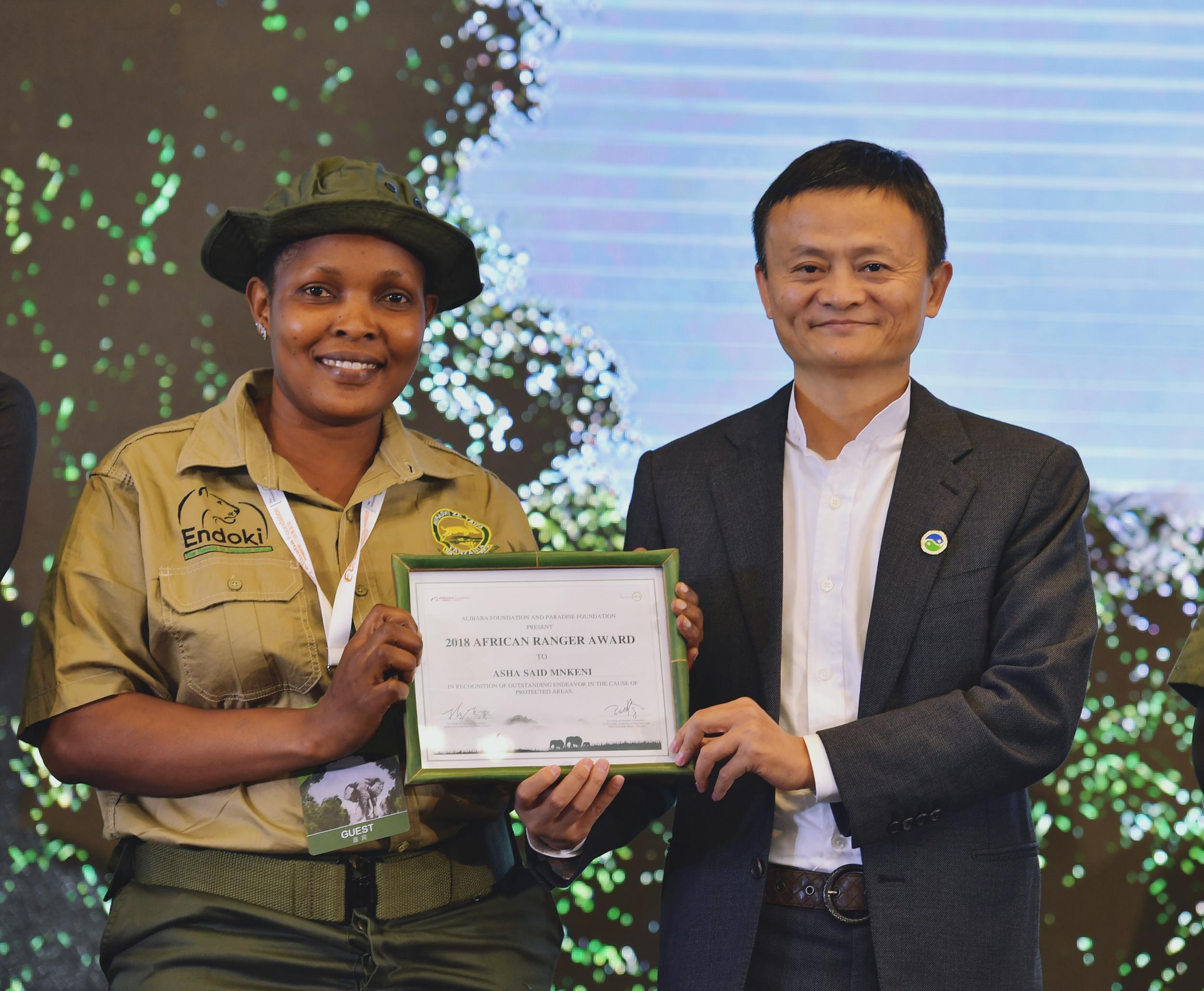China’s richest entrepreneurs back new conservation awards for African rangers
Chinese demand drove poaching. Now businesses are saying: it has to stop

As a ranger in a national park in Zambia, Vorster Mweene’s strategy to deal with poachers was so successful that he and his family received death threats, and he had to be transferred to work in another far away area.
In Gabon, Hamed Salvadord regularly leads weeks-long patrols deep into the central African hinterland, arresting suspected poachers targeting elusive and highly-endangered forest elephants.
Asha Mnkeni, Tanzania’s first female ranger, is today part of an elite unit whose work includes persuading villagers that elephants are worth more alive than dead and that they should direct authorities to poachers in their midst.
What unites these three rangers is their work to deal with the sustained threat to wildlife from poachers feeding demand for animal parts in Asia, and in particular in China.
So it is perhaps striking that they are among 50 African rangers honoured as part of a new scheme backed by a group of China’s richest entrepreneurs, including Jack Ma whose Alibaba Group includes China’s largest online retailer, and the founder of Tencent, which runs WeChat, China’s leading mobile messaging service.
They and a handful of others formed an environmental charity, the Paradise Foundation. Its first foray into funding the fight to protect Africa’s wildlife, with the support of the Alibaba Foundation, is the African Ranger Awards. Each year for 10 years, 50 rangers will each win a £2,000 cash prize, a recognition of their dedication and bravery.
Eleven of the winners recently attended an award ceremony in Cape Town in South Africa.
“It’s really a great motivation to us as rangers that people all over the world hear about our work and see what we do, and decide to give these kinds of awards,” said Walter Odokorwot, community conservation warden at Kidepo Valley National Park in Uganda.
“The job is hard, and as well as working all the time away from our families, we are often at great risk,” said ‘Nanyuki’ Lapalee, a former elephant poacher turned ranger at Kenya’s Lewa Conservancy.
The award winners represent some of the estimated 20,000 to 25,000 frontline staff who risk their lives every day to protect Africa’s rich and diverse natural wildlife.
A 2016 survey found that 82 percent of Africa’s conservation rangers had faced mortal danger at work, and 60 percent had been directly attacked. More than 1,000 rangers lost their lives protecting wildlife and wild habitats between 2000 and 2016. Five of the 50 rangers honoured by the Paradise Foundation won posthumously, having been killed at work.
“These rangers are sacrificing so much to protect Africa’s wildlife against illegal hunting and trading. With this award, we hope both to recognize their important work and to bring greater attention to the ways in which we can all contribute to protecting the natural world,” said Jack Ma.
“It is up to all of us to work together to safeguard our planet’s wildlife and resources for future generations. We don't want our children to ask us in 50 years, 'What are elephants?', or 'What are tigers?'. We don't want these animals only to be seen in museums.”
Philanthropy in China is a new and fast-growing activity as the country’s newly-minted elites - Mr Ma used to be a schoolteacher and is entirely self-made - look to use their wealth to do good in China and beyond.
It has been Chinese demand for products derived from parts of African animals, including endangered animals like elephants and rhinoceroses, that has prompted the poaching crisis in the first place. The involvement of Chinese business in trying to address the crisis has been criticised as too little, too late.
Max Graham, CEO of Space for Giants, an international conservation charity based in Kenya and working to protect elephants and their habitats in eight African countries, disagrees. Space for Giants’ patron is Evgeny Lebedev, the owner of The Independent.
“It’s not just business, it’s the Chinese government, who you must remember acted to ban their domestic ivory trade, which was driving a huge proportion of the illegal killing of elephants,” Dr Graham said.
“That’s had a huge impact already, but it would be wrong to say it’s fixed the problem. The illegal wildlife trade affects many, many more animals than just elephants.
“When people like like Mr Ma, or the founders of organisations of the size and influence of Tencent, stand up and say, we fully endorse the conservation of Africa’s biodiversity and we will put our money where our mouth is, that has a huge ripple effect through Asia, which is where most of these products still end up. It’s a huge step and very, very welcome.”
Beyond describing the rangers as heroes, Mr Ma in his address to the awards ceremony highlighted how conservation can drive African economies. Many Africans see conservation and wildlife tourism as an activity for foreigners that brings them few benefits.
But Mr Ma highlighted that tourism and community conservation were among Africa's fastest growing economic sectors, and both relied on the survival of wildlife currently targeted by poachers.
“Rangers are the heroes because they protect the natural world for us and by doing that they protect jobs. I'm very honored to be able to do this very meaningful thing and recognize their work,” Mr. Ma said.
Join our commenting forum
Join thought-provoking conversations, follow other Independent readers and see their replies
Comments
Bookmark popover
Removed from bookmarks